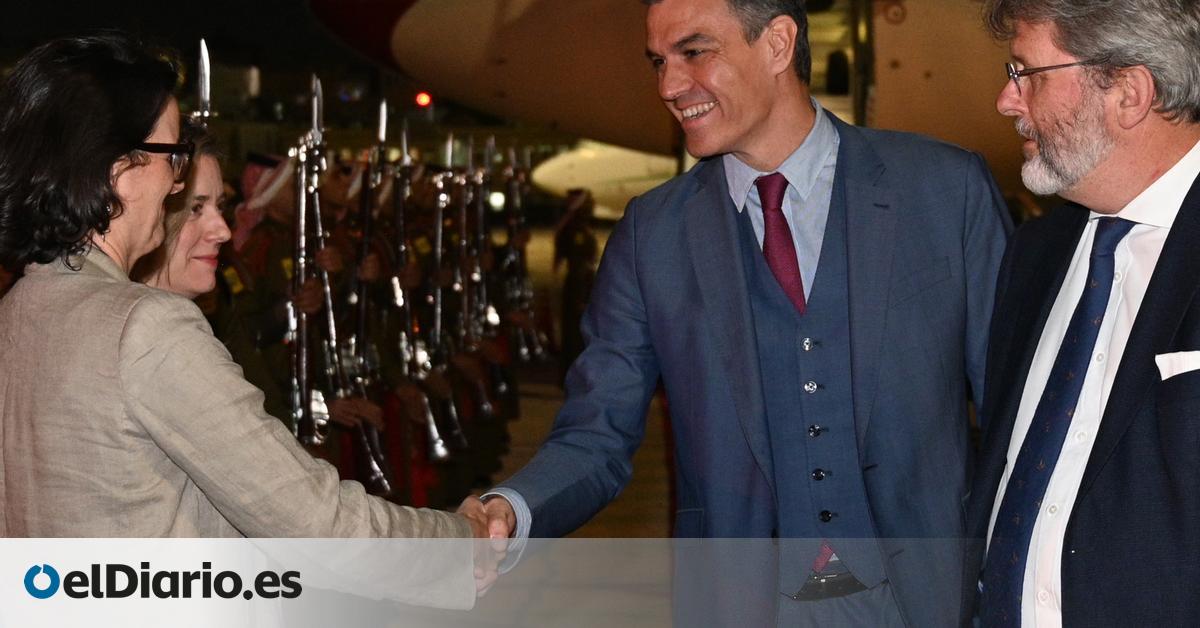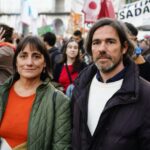
Pedro Sánchez landed in the Middle East this Monday for the second time since the outbreak of the war in Gaza and a few hours after confirming a new bombing attributed to Israel in the capital of Syria, this time on the Iranian embassy in Damascus. After his visit to Israel, Palestine and Egypt last November, the President of the Government will this time take to Jordan, Qatar and Saudi Arabia, three of the most influential countries in the region, the same message launched then in front of the gates of the crossing. Rafah: the need for urgent recognition of the Palestinian State by the entire International Community that gives way to a political solution to the conflict for coexistence between the two states.
In conversation with journalists during the flight this Monday, the head of the Executive conveyed his confidence that, following the UN Security Council resolution that advocates for an imminent ceasefire during the celebration of Ramadan, in the coming weeks transcendental movements occur “at a multilateral level” that can give way to a new horizon. And he openly pointed out “this semester” as the time frame in which the recognition of Palestine should be addressed. At the time the plane took off from Madrid heading to Amman, the Jordanian capital, there was still no news of the air attack in Syria attributed to Israel.
The president recalled that his Government is in a position to take the step of recognizing Palestine as long as two “conditions” are met: that Spain is not left alone on that path and that it serves for the definitive resolution of the war in Gaza. .
In this way, Sánchez urges European partners such as his counterparts from Ireland, Leo Varadkar, Malta, Robert Abela, and Slovenia, Robert Golob, who also showed their willingness to follow in his footsteps as long as this “can make a positive contribution and the circumstances are the correct ones”, to accompany the Spanish Executive in a bet that he himself defended personally before the Israeli president, Benjamin Netanhayu. During this trip he will maintain the same before the top leaders of countries such as Saudi Arabia or Qatar, which do not recognize the State of Israel.
The Executive explains that the main reason for the official trip to the region is “to see what the main Arab countries think about possible ways out” of this conflict. “We advocate for a peace conference, the recognition of the Palestinian State and an agreement for the release of hostages,” they emphasize.
The Spanish president’s agenda includes a visit this Tuesday to one of the main UNRWA refugee camps in Jordan, the United Nations aid organization for Palestinian refugees that the Israeli Government intends to dismantle. This same Wednesday it was learned that last week Israel submitted to the UN a proposal to end the agency and transfer its personnel to another that will replace it and that will deliver food on a large scale in Gaza, as United Nations sources have indicated to The Guardian.
During his stay, Pedro Sánchez also has bilateral meetings planned at the highest level with Jordanian King Abdullah II, with the Saudi Crown Prince, Mohamed bin Salmán, and with the Qatari Emir, Tamim bin Hamad Al Thani. Before everyone, he will emphasize, according to Sánchez himself, “the defense of a pacifist foreign policy” in the face of the “verbal escalation” of other international leaders, whom the president did not mention but from whom he distanced himself from any warmongering postulate. .
Continuity with the PNV in Euskadi, change with Illa in Catalonia
In that same conversation with journalists during the flight to the Middle East, Pedro Sánchez drew a scenario of stability for Spanish politics and once again set the time limit of his mandate in 2027. Despite the turbulence implied by the marathon of elections in spring , who has already left this year’s General State Budgets by the wayside, the president is confident that the period of almost two years without polls that must open after the June meeting of the European elections should contribute to institutional normalization and make lasting a legislature right now in deadlock.
The leader of the PSOE does not even believe that a change of government in Catalonia will represent a disincentive for the Catalan independence forces in the face of the essential support they provide in Congress. The president assured the press that the electoral forecasts that his party manages in the race for the Generalitat even exceed the expectations drawn by the polls. And based on a resounding victory for the PSC, the bet is that Salvador Illa can lead the next Catalan Government.
Questioned as to whether the political price of this success could be paid by himself in the first person with parties like Junts or ERC outside the parliamentary majority on which his Executive rests, the president rejected that prediction. “If we win and govern in Catalonia, it will be shown that Catalan society values the direction we have taken. And that in itself will be a very important message, of great strength for everyone,” he said in reference to the position that Puigdemont and Junqueras may adopt from now on.
Regarding Euskadi, the president wanted to be scrupulous with the position publicly held by the Basque socialists, who have repeatedly rejected the hypothesis of favoring an EH Bildu government even if they emerge as the first political force. “We have a strategic alliance with the PNV that we aspire to reissue,” Sánchez limited himself to pointing out in this regard.
The official agenda in the Middle East will be started by the President of the Government early this Tuesday with a visit to the Hussein Camp refugee camp of the United Nations Agency for Palestine Refugees in the Middle East (UNRWA), where he will meet with the Deputy Commissioner General, Nathalie Boucly, in the midst of the Israeli offensive on the institution.
Source: www.eldiario.es

